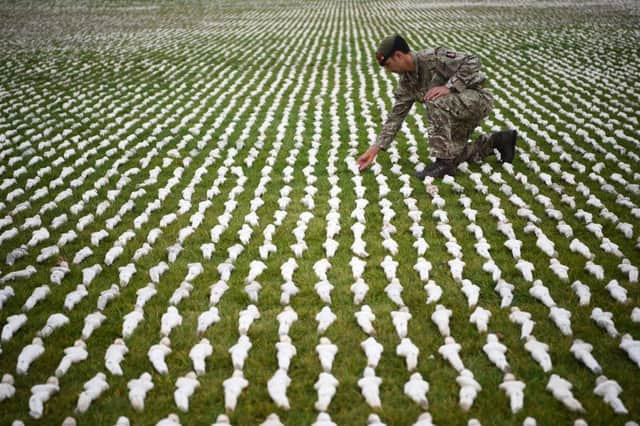David Behrens: Respect for the soldiers and stories that we must never forget


It was HG Wells who was said to have called it the War to End Wars, as early as 1914, but of course, he spoke too soon, and it was to be a mere 21 years that would punctuate the end of the first conflict and the beginning of the next one.
Advertisement
Hide AdAdvertisement
Hide AdFor my generation of so-called baby boomers, born in the years following the Second World War, the memories of its aftermath are still palpable, and I am struck, not just this year but every Remembrance Sunday, by how quickly the fortunes and expectations of each successive generation has improved.
We have our parents and their parents to thank for that. Some 20 years separated my father and my mother’s father, and they both served in the second conflict – my dad as a young navigator with the RAF, posted to Palestine during the final two years, and my granddad as a signaller with the Royal Infantry, who found himself in Normandy a month after D-Day.
Both survived to tell their stories, although, like so many of their comrades, they seldom did. Time has not diminished the enormity of the sacrifice they all made.
Advertisement
Hide AdAdvertisement
Hide AdServing their country, which for practical purposes meant being uprooted forcibly from their families, friends and jobs and being sent away with no certainty that they would return, is a commitment that would be simply unconscionable to anyone of their age today. A person so doing would be considered remarkable, and rightly so.
Yet in their time, it just made them ordinary.
The advance we have made as a society in no longer living under the threat of conscription, of making sacrificial lambs of our young, should never be lost on us, nor taken for granted.
None of my older relatives can now speak for themselves, but some left behind memoirs from which I can begin to piece together their shared experience. The sentiments, if not the details, will be familiar to every family.
My grandfather’s view of the army had been shaped by that of his own father, with whom he shared a forename. Harry senior had been 38 when the first war began, but he was not too old to go to the front. He returned with shellshock and was said never to have been the same person as the one who went out, filled with patriotism and optimism. He died at 58.
Advertisement
Hide AdAdvertisement
Hide AdHarry junior was already a manager at Boddington’s Brewery when, in 1939, he was trained in Morse Code. He was adept at encoding messages but less so at transcribing them back into English, and so, ejected from the Royal Corps of Signals, he spent the rest of the war as 1149580 Gunner Ingle, H.
He managed to get home on leave a few times after Arnhem as the tide turned in the Allies’ favour. My mother never forgot the awful inevitability that those brief visits would have to end.
He spoke only once of his experiences. Two comrades had been blown up by a mine in front of him. He managed to keep his head down. As the remaining troops left the area, they found two cows in a field. Their French owners had left or been killed, and the animals needed milking. Another comrade of Harry’s had been a farmer and he set to work. They kept the cows with them for another couple of days before they had to let them go.
It was the milking, not the loss of the others in his unit, that he had chosen to recount. He took the worst of his memories to his grave, and again, he was not yet 60 when he did so.
Advertisement
Hide AdAdvertisement
Hide AdTheir stories were not unusual. Every serviceman and woman had tales of their own, told or untold, and many were very much more harrowing. Their sacrifices were made so that my generation and those that followed would not have to grow up in the knowledge that one day we might follow them.
With each passing year, the stories become more distant, but if we forget them we lose sight of ourselves. That’s why, in the two minutes of personal remembrance tomorrow and every November 11, I choose to reflect on them and to bow my head in respect for those who told them and for those who did not return to tell.
On this centenary year, that is more important than ever.